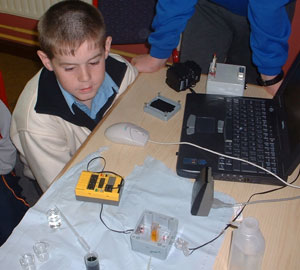| 2003 |

|
YEAR BOOK |
Dublin City University
|
Children making sense of science!
|

The centre has a strong education outreach initiative with specific programmes aimed at primary, secondary and third level education (both undergraduate and postgraduate). At primary level, the NCSR is collaborating with Media Lab Europe in a Higher Education Authority-funded project entitled 'Sensors for Science Education and Environmental Monitoring'.
The main focus of this project is to develop innovative sensors which will stimulate children's interest in science at primary school level through exciting and interactive, project-based learning. These sensors are designed to be compatible with mobile and static computational platforms such as the LEGO� Mindstorms� system. We have developed a number of robust physical and chemical sensors which have been introduced into selected Primary Schools in our pilot project.
The sensors have been developed in the context of the new Primary School Science Curriculum which was introduced into the classroom environment in September 2002. A range of experiments have been designed around the sensors. Currently children are using these sensors to make measurements of different parameters in the world around them. Scientific areas explored using NCSR sensors and software include:
|
� Principles of thermal insulation and cooling with different materials
� Demonstrating that oxygen is required for combustion � Exploring the pH of everyday liquids � Investigating the role of oxygen in breathing � Principles of colour and light. |
The first phase of sensors developed covers oxygen, acidity and colour. The oxygen and colour sensors are based on LED's (Light Emitting Diodes) and photodiodes, and the oxygen system incorporates novel printable sensor films developed at NCSR. Similarly, a robust production process for low cost sensors has been developed for the acidity sensor.
In the next phase of this project, sensors will be incorporated in an interactive web-based environmental monitoring system.
The NCSR Education outreach programme aims to play a role in developing greater interest and understanding of science and technology, thereby supporting graduate entry numbers. We aim to nurture the next generation of researchers, which is vital in building a world-class research infrastructure in both academia and industry.
Contact: Prof. Brian MacCraith;
Tel: +353-1-700-5299(Direct);
Tel: +353-1-700-8821(NCSR);
Fax: +353-1-700-8021;
E-mail: [email protected] ;
Web: www.ncsr.ie